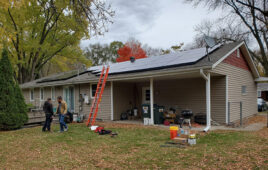BLM attempts to open more California desert land to renewable energy development
Washington, D.C.
In one of the final acts under the Trump presidency, the Bureau of Land Management proposed amendments to California desert management plans that would add over 800,000 acres of public land for renewable energy development. The Center for Biological Diversity opposes the amendment and said it hopes the Biden Administration will keep the former plan in place.
Biden starts presidential term with raft of climate-related executive actions
Washington, D.C.
During his first week in office, President Biden took executive action to re-enter the Paris Climate Agreement, create a council on environmental justice, take a government-wide approach to the climate crisis and more. SEIA commended his actions, saying they address several solar industry priorities. The trade organization may see significant success with its solar policy goals in Congress as well due to the new Democrat trifecta.
California awards $2 million to Native American tribes to advance clean energy
Sacramento, California
The California Energy Commission has awarded nearly $2 million to help Native American tribes identify solutions to reduce carbon emissions and improve clean energy access on Tribal lands. The grants support clean energy feasibility studies and other plans for eight California tribes.
Massachusetts governor vetoes major climate legislation
Boston, Massachusetts
Massachusetts Gov. Charlie Baker vetoed a comprehensive climate bill that would have required the state to procure 40% renewable energy by 2030 and make clean energy more accessible to low-income populations, citing economic concerns. Democrat state lawmakers vowed to quickly pass the legislation again in the new session.
New Mexico legislator introduces clean electricity bill to expand on Energy Transition Act
Albuquerque, New Mexico
New Mexico Rep. Nathan Small introduced a bill to shift the state’s energy consumption from fossil fuels to clean energy. The Clean Electrification Act would lock in a firm emissions reduction path of 4% per year to reach the Energy Transition Act’s full decarbonization requirement.
Gov. Cuomo announces over $17 million for community-scale clean energy efforts
Albany, New York
Gov. Andrew Cuomo announced $17 million in funding to help New York communities invest in clean energy solutions like community solar projects and electric vehicles. The program also provides “Clean Energy Community Coordinators” at no charge to help communities develop and prioritize clean energy goals.
New Wyoming bill could endanger solar net metering
Cheyenne, Wyoming
A bill asking the Public Service Commission to review Wyoming’s net-metering structure was approved by a committee in state legislature in mid-January, according to the Casper Star Tribune. Opponents of the move asked the legislature to table the bill until they research the possible harm to the solar industry more thoroughly.
Minnesota PUC fines Xcel Energy for excessive solar interconnection failures
Saint Paul, Minnesota
Minnesota’s Public Utilities Commission fined utility Xcel Energy $1 million for exceeding a maximum number of customer service complaints due to delays in processing interconnection requests for solar projects, according to IREC. The PUC also added new requirements for the utility to try to fix the root cause of interconnection delays.
Arizona republicans attempt to block state’s new clean energy rules
Phoenix, Arizona
GOP lawmakers in Arizona are pushing a bill that would block the Corporation Commission’s requirement that electric companies reach 100% carbon-free energy by 2050, according to azcentral.com. The utility regulators worked for four years to pass the bipartisan clean energy legislation.






Power utilities shall encourage net metering( metering before meter) to prosumers and gross metering (after the meter) to prosumers and industry solar producers irrespective of political entity. Renewable of any type shall be encouraged to mitigate green house gases as also reduce earth planet temp by 1.5C – 2.0C
As regard converting un-inhibited land to land for solar Form, it is a welcome move as in addition to its effect in improving the environs, it will reduce forest fire in California and solar forms will act as fire barriers and reduce population density in crowded peripheral towns. State Government shall help community to move to such new locations and get jobs.
Bills and court lawsuits for, the same against across the U.S. is the paralyzing effect of analysis paralysis. Net metering is fair, net metering is not fair. Mandates need to be strictly adhered to, mandates are contingent on technology not available at this time. “Give” the utilities free reign and all the money they claim they need and it can be (done) in 5 to 10 years. How much do you want to pay?
FERC is the wholesale energy regulating agency, under Federal law there are many rights of ways and easements along railroad tracks, interstate highways across the U.S.. Use these rights of ways to get HVDC transmission that will allow coast to coast and north to south dispatching of renewables projects across the U.S. to get the generation to market. Probably sooner than later FERC will have to assert their influence in the energy market and either change or eliminate the current structure of ISOs and RTOs across the U.S.. Too many chefs have spoiled the broth.
Solarman, the Rights-Of-Way (ROW) along interstate highways are for multi-modal transportation use. Yes, there is a Federal Utility Accommodation Policy, and each state has a state Utility Accommodation Policy, but, it is an “accommodation” to a utility to be allowed into the ROW. Safety policy is constantly evolving and the areas along the interstate must remain clear of obstructions that will kill or seriously injure, if a vehicle departs the roadway and strikes a fixed object. Capacity is constantly being added to the interstate system to reduce traffic delays and the ROW is constantly shrinking by adding many lane miles each year. East of the Mississippi River, ROW space is already at a premium and adding high voltage DC towers along the roadway will only cause more accidents and traffic backups, and there for, INCREASE energy use.